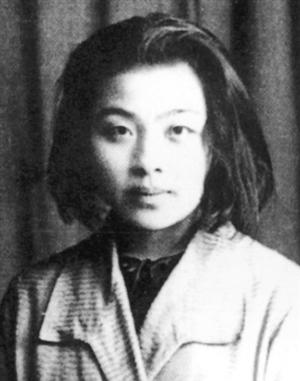
彭德怀速写
◎ 丁玲
“一到战场上,我们便只有一个信心(1),几十个人的精神注在他一个人身上,谁也不敢乱动(2),就是刚上火线的(3),也因为有了他的存在而不懂得害怕。只要他下一声命令‘去死!’我们就找不到一个人不高兴去迎着看不见的死(4)而勇猛地冲上去!我们是怕他的,但我们更爱他!”
这是一个二十四岁的青年政治委员告诉我的,当他述说着这一段话的时候,发红的脸上隐藏不住他的兴奋。他说的是谁呢?就是现在我所要粗粗画几笔的彭德怀同志,他现在正在前方担任前敌副总指挥的工作。
穿的是最普通的红军装束,但在灰色的布的表面上,薄薄浮着一层黄的泥灰和黑色的油(5),显得很旧,而且不大适宜(6),不过在他似乎从来都没有感觉到。脸色是看不清的,因为常常都有许多被寒风所摧毁的小裂口布满着,但在不能成为漂亮的脸上(7)有两个黑的、活泼的眼珠转动,看得见有在成人脸上找不到的天真和天真的顽皮。还有一张颇大的嘴,充分表示着顽强,这是属于革命的无产阶级的顽强的神情。每一遇到一些青年的干部或是什么下级同志的时候,看得出那些昂昂的心(8)都在他的那种最自然诚恳的握手里温柔了起来(9)。他有时也同这些人开着玩笑,说着一些粗鲁无伤的笑话,但更多的时候是耐烦地向他们解释着许多政治上工作上的问题,恳切地显着一个对同志间的勉励。这些听着的人便望着他,心在那些话里沉静了起来,然而同时又更奋起了!但一当他不说话沉思着什么的时候,周围便安静了,谁也惟恐惊扰了他。有些时候他的确使人怕的,因为他对工作是严厉的,虽说在一切生活上是马马虎虎(10),不过这些受了很凶的批评的同志却会更爱他的。
拥着一些老百姓的背,揉着它们,听老百姓讲家里事。举着大拇指在那些朴素的脸上摇晃着(11)说:“呱呱叫你老乡好的很……”他们也会拍着他,或是将烟杆去送到他的嘴边,那怕他总是笑着推着来拒绝了。后来他走了,但他的印象却永远留在那简单的纯洁的脑子中。
A Brief Sketch of Peng Dehuai
◎ Ding Ling
“Once on the battlefield,we begin to trust only one man.Scores of us will focus our attention on him and none dare to slack off.Even newcomers to the battlefront will throw aside all fears so long as he is present.When he gives orders,all will charge ahead unhesitatingly to defy the invisible presence of certain death.Yes we fear him,but we love him more.”
That’s what I heard from a 24-year-old young political commissar.While making these remarks,he flushed with excitement.Whom did he refer to?It’s Comrade Peng Dehuai,of whom I’m now making a brief sketch.At this moment he is our front-line Deputy Commander-in-Chief.
He is attired in the common grey uniform of a Red Army man,which,covered with a thin layer of yellowish dust and black greasy dirt,looks very shabby and,moreover,very unbecoming to him.But he doesn’t seem to care.His facial features are somewhat blurry because they are often chapped all over by the cold wind.From the pair of lively black eyes rolling about on a face short on handsomeness,one detects naivety and mischief seldom seen on the face of an adult.And his big mouth is fully expressive of tenacity—the tenacity of a proletarian revolutionary.Whenever young cadres or junior comrades meet him,they will have their militant hearts mollified by his most natural and sincere handshakes.Sometimes he also enjoys bantering with them,cracking jokes that are coarse but harmless.Much more often he will patiently explain to them various problems concerning politics or work,offering comradely encouragement in all sincerity.His listeners will have their hearts calmed down by his words and meanwhile feel pepped up.When he is silently absorbed in thought,everybody around him will keep quiet lest they should disturb him.Sometimes he is really stern and forbidding because,though lax about things in his own personal life,he is very strict with work.Those who have been harshly criticized by him will nevertheless love him all the more.
He often engages in small talk with villagers while holding them by the shoulder or stroking their backs.He will give the thumbs-up to the simple and honest peasants,saying,“Hi,you buddies are real nice guys…”They will in turn pat him on the shoulder or try to put their long-stemmed Chinese pipes to his mouth which he always declines with a smile.When he leaves them,he will always leave behind a permanent impression on the simple and honest country folks.
丁玲(1904—1986),湖南临沣人,是我国现代杰出女作家,以小说创作著称,抗战爆发后,从事大量散文写作。她的散文大多注重人物刻画。《彭德怀速写》就是她写于1936年12月的一篇著名的人物速写。彭德怀(1898—1974),湖南湘潭人,是国家和军队的杰出领导人,作战勇敢,耿直刚正,廉洁奉公,严以律己。人民永远怀念他,对他生前所受的不公正待遇莫不深表同情与悲愤。
注释
(1)“我们便只有一个信心”意即“我们便只信任一个人”,故译为we begin to trust only one man。
(2)“谁也不敢乱动”可按“谁也不敢懈怠”之意译为none dare to slack off,比none dare to disobey或none dare to violate discipline等确切。
(3)“就是刚上火线的”译为Even newcomers to the battlefront,比Even those who come to the battlefront for the first time简练。
(4)“迎着看不见的死”译为to defy the invisible presence of certain death,其中用to defy(不顾)表达“迎着”;又certain作“必然发生的”、“不可避免的”解,是译文中的增益词,用以加强death。
(5)“黑色的油”意即“黑色的油迹”,可译为black greasy dirt或black oil stains。
(6)“而且不大适宜”意即“而且与他本人不太相称”,可译为and,moreover,very unbecoming to him或and,what’s more,very unsuitable for him。
(7)“不能成为漂亮的脸上”意即“谈不上是漂亮的脸上”,故译为a face short on handsomeness,其中short on是成语,作“缺乏”、“不够”等解。
(8)“昂昂的心”可按“富于战斗性的”或“激进的”译为militant hearts或high-spirited hearts。
(9)“温柔了起来”意即“使平静起来”,不宜译为softened by,现译mollified by。
(10)“生活上是马马虎虎”可译为lax about things in his own personal life或按“生活清苦,不修边幅”译为living an austere way of life and caring little for his appearance。
(11)“举着大拇指在那些朴素的脸上摇晃着”译为He will give the thumbs-up to the simple and honest peasants,其中to give the thumbs-up to作“向……翘拇指表示赞赏”解。此句也可译为He will hold up his thumb and wave it to the face of the simple and honest peasants,其中to the face of作“当面”解。






